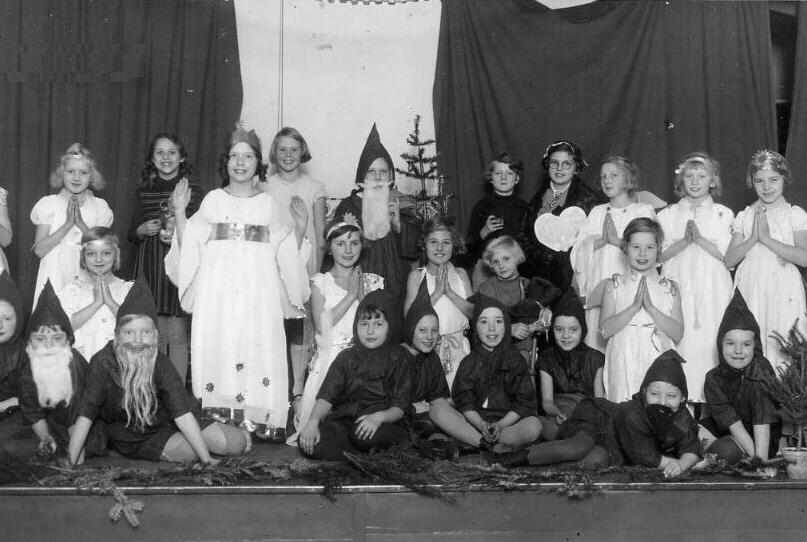

German Christmas: Christmas Day (December 25)

Figure 1.--Germany was where the Reformation began and in Germany Protesantism means Luthernism. The Christmas Kind became the focus of the Lutheran Christmas. Lutheran families tend to exchge gifts on December 25. Now even for children it did not make much sence for the Baby Jesus to dispense Christmas gifts. So over time a new Christmas character appeared--the beautiful Christmas angel. Here we see a school or church pagent in 1932 with the Christmas angel as the main character. We don't see the Christmas Kind, but there are quite a number of angles.
|
|
Germany was where the Reformation began and in Germany Protesantism means Luthernism, although there are other smaller Protestant denominztioins. Luther had a great deal to say about Christmas. He wanted to demphasized Catholic saints and one of thse saints was St. Nicholas. Thus Luthern families began to give more attention to December 25, meaning Christ's birthday rather than St. Nicholas Day. The Christmas Kind became the focus of the Lutheran Christmas. Lutheran families tend to exchage gifts on December 25. (This is in large measure why December 25 is so important in America--even with Catholics.) Now even for children it did not make much sence for the Baby Jesus to dispense Christmas gifts. So over time a new Christmas character appeared--the beautiful Christmas angel. As a result, the Christmas angel has become a major part of Christmas in Germany. There used to be major differences between Catholic and Protestant families. I am not sure what has happened in Germany during recent years with the declining importance of religion.
Protestants
Germany was where the Reformation began and in Germany Protesantism means Luthernism, although there are other smaller Protestant denominztioins. Luther had a great deal to say about Christmas. He wanted to demphasized Catholic saints and one of thse saints was St. Nicholas. Thus Luthern families began to give more attention to December 25, meaning Christ's birthday rather than St. Nicholas Day. The Christmas Kind became the focus of the Lutheran Christmas. Lutheran families tend to exchage gifts on December 25. (This is in large measure why December 25 is so important in America--even with Catholics.) Now even for children it did not make much sence for the Baby Jesus to dispense Christmas gifts. So over time a new Christmas character appeared--the beautiful Christmas angel. As a result, the Christmas angel has become a major part of Christmas in Germany. A German reader tells us about his Christmas experiences, "You write 'Germany Protesantism means Luthernism'. Yes and no. In the South-West (parts of Baden-Württemberg around Stuttgart, Ulm, Heilbronn) we say we are "reformed"--reformiert protestantisch. This is not exactly "lutherisch" - there are some theological differences, well which only the clergyman remember and understand (although we have learnt it in the confirmation class and the religion classes in school). "Reformiert protestantisch" is influenced by the Swiss "reformiert" by Zwingli in Zürich. When I grow up in the Stuttgart area I was listed as "evangelisch". When we lived in Zürich (1968-1971, I was married)) we were registered in the civil register as "reformiert". Now in Hassia (which has more influence from Luther) we are again "evangelisch" but we know that it is not absolutely the same as in the youth.
December 24 is a working day, half-day. In our church community there is at about 3 pm a church
service for children (Kindergottesdienst) and their parents, for adults there is service at 5 pm.
My wife tells from her youth (she grew up near Ulm) that the children lit a candle at the church in the Kindergottesdienst and carried the candle home to light the candles of the chistmas tree there. I grew up in Stuttgart a much bigger town where this custom was not practiced. (The way home was much longer than in the small town of my wife - and, as I wrote already, we had at home electric bulbs for the tree.) At home the "Bescherung" (presentation of gifts) started for the children and later for the adults, toys, new clothes etc. and parcels lying around the tree. It is more or less the same to-day, although much
more commercialised. For the children we say that the "Christkind" has brought the gifts, the
children have to present a poem or to sing some Weihnachtslieder (Xmas songs) before they are allowed to open the parcels. Families without children went/go to the second Gottesdienst at 5 pm. Besides the reading of the "Weihnachtsgeschichte" (Lukas such and such, sorry, I am not good in this) and the regular
sermon there is always some music presentation. One meets neighbours and friends and wishes
"Frohe Weihnacht" / "Frohe Weihnachten". Back at home we open the parcels lying around the christmas tree with gifts from each other and from close relatives. My wife likes to present some Chistmas music, too. We don't mention a "Weihnachtsengel" (Christmas angel), although we have one placed at the top of the tree.
Both services at church are very well attended, usually the church is overcrowded (normal Sundays only a small number of community members will show up). I can't say much how the catholic people celebrate Xmas. There is a "Christmesse" / "Christmette" late in the evening, 10 pm or 11 pm (evangelische communities begin to offer this church service, too - we think this is a real Lutherian influence from Northern Germany -). In Germany, December 25 and December 26 are legal holidays. One may again go to church for
the Weihnachtsgottesdienst, Dec. 25, say, 10 am - if the community supports a choir often
there is a presentation of a classical Oratorium (e.g., by Johann Sebastian Bach) or some more
recent musical composition. Families meet for dinner or travel to close relatives living in another
part of Germany. Youngsters and younger families start for skiing holidays in the Alps. In the
"reformed" areas Dec. 27 is the third "Weihnachtsfeiertag" (not legal), where one may make
some more official visits to friends. Many companies allow their co-workers to stay at home,
the
Catholics
Modern Trends
There used to be major differences between Catholic and Protestant families. I am not sure what has happened in Germany during recent years with the declining importance of religion. Whether or not a family is religious, however, Christmas is still important, both for tradition and because it is so important to children.
HBC

Navigate the Boys' Historical Clothing Web Site:
[Return to the Main German Christmas page]
[Return to the Main German holiday page]
[Introduction]
[Activities]
[Biographies]
[Chronology]
[Clothing styles]
[Countries]
[Girls]
[Bibliographies]
[Contributions]
[Essays]
[FAQs]
[Glossaries]
[Images]
[Links]
[Registration]
[Tools]
[Boys' Clothing Home]
Created: 7:03 PM 12/13/2007
Last updated: 5:24 AM 12/26/2007




